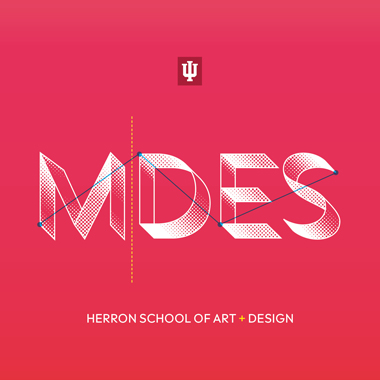Incoming IUPUI students seeking a competitive advantage in leading design-driven innovation will be able to enroll in a new master's degree program beginning in fall 2023.
The Master of Design (M.Des.) program offered by the Herron School of Art and Design will teach students how to use design methods to solve a wide range of problems in businesses, organizations, institutions, and communities. The program responds to a growing demand for people-centered strategic thinking and decision-making.
Companies in today's economy actively seek to increase their value through strategic innovation. This challenging work necessitates diverse, creative teams to devise new solutions to old problems. With a focus on empathy-driven research, iterative solution development, and powerful storytelling, designers are uniquely positioned to be leaders in this space.
This is where Herron's new master's degree program comes in.
"We're all about recognizing multiple perspectives," clarifies Pamela Napier, an associate professor in Herron's visual communication design department. "We tie [design] to social innovation and public or community-engaged scholarship."
Design, according to Napier, is more than aesthetics. It's a thought process that aims to improve people's lives and society. "We're pushing the typical boundaries of designing," she explains. "It's not only focused on artifact-making, but it's looking more strategically at collaborative problem-solving."
Market-based relevancy
Herron's M.Des. degree is the first of its kind in Indiana. The 60-credit hour coursework will prepare students to think beyond the symptoms of a complex emerging or future problem using the professional practice of design research. As design researchers, their problem-solving toolkit will include customer journey maps, stakeholder interviews, online surveys, and participatory design, among many other science-based methods.
The visual communication design department -- where the M.Des. program resides -- has a rich history of collaborative partnerships on and off campus through faculty research. Students will learn the professional tools and techniques of the trade through authentic project-based learning with campus and community partners.
"Our faculty are leading collaborative work that's not only transdisciplinary, it's from multiple offices, buildings, and areas on campus but also communities and organizations in and around Indiana and beyond," Napier says. "We're doing the work we're teaching the students to do."
Recently, Napier partnered with David M. Craig, a professor of religious studies in the IU School of Liberal Arts at IUPUI on a Charles R. Bantz Community Fellowship Award. She involved her graduate students in a project looking at the Healthy Indiana Plan to improve healthcare options and break down barriers to having accessible healthcare.
"Our graduate students were facilitating community feedback sessions and online remote design sessions with our community partners," says Napier. "They were crafting these sessions to allow and enable community members to share their experiences, opinions, and ideas and then they were able to capture them, synthesize them, and share them."
Through these experiences, graduates will be prepared to drive growth in any industry and sector. The degree will enable them to advance or switch careers in design research. They will work as data analysts, experience design researchers, lead project strategists, research leads, senior solutions architects, experience design directors, and other roles to help employers and clients solve problems.
A retooled, flexible curriculum
While the M.Des. degree program is new for the fall 2023 semester, it is an evolution of the school's Master of Fine Arts (M.F.A.) in visual communication design. The M.F.A. program began in 2007 and quickly established a strong track record of job placement for its graduates, demonstrating the distinctiveness of a curriculum focused on design research.
"Our [M.F.A. alums] are working and flourishing in leadership positions where they're working on strategic development and in all kinds of organizations and different sectors -- from healthcare to technology to policy design to education," says Napier. "They're also becoming entrepreneurs. They're starting their own businesses, and they're also working in different areas of design."
She also mentioned that the new M.Des. degree is more adaptable, allowing students to complete their degree in part online for more flexible career advancement. The method courses will be available online, with the option of in-person instruction depending on enrollment. Offering online courses will allow students to begin their studies before officially starting the program.
The M.Des. program seeks applicants with a wide range of educational and professional experience. Working across disciplines to find common ground is part of the nature of collaborative work. As a result, prior design experience is not required.
"Students can come in without any kind of visual background," Napier says. "There are different ways for them to show their work and talk about their work, so we meet them where they are in terms of their background."
Faculty will also encourage students to make the most of their graduate experience based on their previous work experiences and the roles they wish to pursue after graduation. "We're focusing even more so now on helping students shape their own path based on their experiences, their goals, and their interests," Napier explains. "It's about helping them find what's going to make the most sense [in their careers] as they move through [the program]."
Applications for the M.Des. are now being accepted. The application deadline is Jan. 15.
For more information, email hadmit@iu.edu or call Herron's Office of Admissions and Student Services at 317-278-9400.


